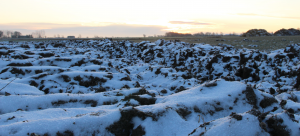By Johannes Albertsson and Georg Carlsson (SLU)
Climate CAFE is represented in Sweden by the Swedish University of Agricultural Sciences (SLU) and is involved in activities related to work packages (WP) 1, 2 and 4 which seek to:
WP1: mobilizes, facilitates and assesses solutions to the adaptation of innovative European agricultural systems to climate change, through a participatory research approach with 10 pilot groups (adaptation pilots).
WP2: collects, analyzes and synthesizes data from new and old experimental culture system, to synthesize the levers and solutions which could be effective to adapt European culture systems to climate change.
WP4: models and simulates the impact on the agronomic and environmental performance of adaptation strategies to climate change formalized in WP3. The compromise between “mitigation” and “adaptation” will also be evaluated through simulation particularly on greenhouse gas emissions, the budgets of C, N and water.
This year the SLU team has planned several activities to advance the goals of each WP:
In reference to the Swedish Adaptation Pilot and WP1:
A homepage for the Swedish AP has been created: http://www.slu.se/adaptation_pilot_skane
The Swedish Adaptation Pilot is also known as ‘Adaptation Pilot Skåne’ (the name of the region where the pilot is located; Skåne in Swedish, Scania in English). The AP includes a Swedish group of farmers, scientists and other stakeholders engaged in the co-design of cropping systems for improved climate change adaptability.
The main adaptation options in which the Swedish Adaptation Pilot is focusing one are:
- Always have fields covered with a growing crop (“never black soil”).
- On-field water management (drainage, irrigation and soil structure-improvement by liming)
- Collaborative water management (collaboration between farmers and local municipally and/or county authorities)
- Reduced tillage

Never black soil is of key importance for the Swedish AP. Picture credit: Linda Maria Mårtensson (2015) SLU
The Swedish AP is also preparing a study visit to Denmark with hopes to meet both representatives from the Danish AP and the reduced tillage association FRDK (Foreningen for Reduceret Jordbearbejdning i Danmark).
In reference to WP2:
The SLU team is preparing a manuscript with the preliminary title “Does the inclusion and position of legumes or grass/legume leys in crop rotations affect the yield stability of cereals in the same rotation” in cooperation with Moritz Reckling (ZALF), Anthony Vermue (INRA) and Kairsty Topp (SRUC).
The SLU team has performed water infiltration measurements in one of the Swedish LTEs comparing crop rotations with and without grass/clover leys. And the goal is to provide more data for WP4. At the moment, SLU has delivered data from one Swedish LTE and hopes to deliver from a second LTE in the coming weeks.


